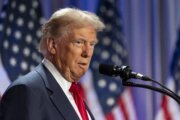Volatility in early August has sparked the interest of Washington, D.C. pundits lately as the ups and downs of the stock market have become predictably politicized. After all, voters consistently rank the economy as their No. 1 concern — and battleground states like Michigan, Pennsylvania and Wisconsin have the economy as a major issue for about 4 out of 5 voters.
[Sign up for stock news with our Invested newsletter.]
The White House can’t just wave a magic wand and pick the stocks that rise and fall, of course. Beyond the general complexities of crafting government policy that works as intended, there are outside events like a pandemic in 2020 or a global financial crisis in 2008 that render the best-laid plans pretty meaningless.
That said, investors may benefit by taking a tactical approach to certain stocks or sectors based on the policies of the incoming administration. Particularly in this “meta” stock market where investor sentiment influences stocks as much as hard numbers, it may not even matter whether or not certain tax credits or restrictive regulations ever materialize; simply the idea of these policies may be enough to move markets after Election Day.
If you’re interested in the difference between a Trump trade and a Harris trade and wondering how to position your portfolio depending on who wins, here are a few themes to watch — particularly because the candidates appear to be on opposite sides of the issue:
— The energy trade.
— The financial trade.
— The industrial trade.
The Trump Energy Trade vs. The Harris Energy Trade
The Biden administration believes in taking serious action to fight climate change, and Vice President Kamala Harris would surely carry that theme into her own administration should she win. A Democratic victory would provide a mandate for continued federal investments in renewables, in particular via subsidies or tax breaks for firms like Enphase Inc. (ticker: ENPH) that have material U.S. manufacturing operations.
In contrast, the Trump trade for energy would likely undercut these alternative energy stocks by eliminating those investments and shifting federal support to fossil fuels. Former President Donald Trump has been vocal in support of faster permits, looser environmental regulations, and the extension of tax benefits for oil and gas firms. Giants like Exxon Mobil Corp. (XOM) and Chevron Corp. (CVX) may benefit a bit, but as multinational stocks they would perhaps see less of a bump than small-cap energy firms that are wholly domestic such as $4.5 billion independent explorer SM Energy Co. (SM).
The Trump Financial Trade vs. The Harris Financial Trade
Trump has a proven track record of cutting financial industry regulation, and he would likely continue that strategy if he wins in 2024. Most notably, the Trump administration worked to roll back fair housing rules under the Department of Housing and Urban Development and helped Congress pass comprehensive regulatory relief legislation in 2018 that targeted reforms of the Dodd-Frank Act. The bottom line would likely improve for banks and support broad funds like the Financial Select Sector SPDR Fund (XLF) as a result.
The track record of Harris is very different. Serving previously as California’s attorney general, she targeted big banks to help residents impacted by foreclosures and win a $20 billion relief package. Additionally, she cracked down on student loan lenders to limit what she saw as predatory lending practices. That’s all good context for how she may approach federal regulatory agencies, and it hints that Wall Street may have a much less receptive administration in the White House should she win in November.
The Trump Industrial Trade vs. The Harris Industrial Trade
It’s perhaps the understatement of the 2024 campaign to say that Donald Trump isn’t a big fan of China. The former president has been very vocal in his attacks on foreign competition, even going so far as to float the idea of a 10% across-the-board tariff on all U.S. imports.
This has two important dimensions. The first would be a tremendous burden placed on multinational firms with overseas customers and supply chains. As one prominent example, Apple Inc. (AAPL) recorded $72.5 billion in revenue from Greater China in fiscal year 2023, roughly 19% of all its sales, and the vast majority of revenue recorded in other regions like the U.S. depends on devices that are manufactured overseas. Things would be much different for firms like Apple if Trump makes good on those tariff threats.
The flip side is a boost for wholly domestic businesses under Trump. Small manufacturers or industrial stocks that are almost exclusively using U.S. facilities to serve U.S. customers would be at a clear competitive advantage if trade barriers go up. As a result, “made in the USA” stocks may see a significant boost even as multinational and foreign firms take the hit.
The manufacturing trade under Harris is also complex. Consider one talking point the current White House likes to trumpet that notes the U.S. auto industry has added over 250,000 jobs over the last four years. Clearly, there is a thumb on the scale there as Democratic policies favor electric vehicles and alternative energy over other technologies, so it’s not like all vehicle manufacturing has benefited equally. Similarly, the Biden administration has focused on high-tech manufacturing and supply chains via the 2022 CHIPS and Science Act to support the semiconductor industry over manufacturing of more traditional goods and machinery.
This is all a long way of saying that both parties have publicly stated a desire to support U.S. manufacturing, protect domestic supply chains and fend off China. But those big-picture statements come with nuance, and different segments of the industrial sector may perform very differently depending on which policies are embraced by the White House.
More from U.S. News
The Rule of 72: How to Double Your Money in 7 Years
9 Best Small-Cap Stocks to Buy in 2024
Recession 2024: What to Watch and How to Prepare
The Trump Trade vs. The Harris Trade originally appeared on usnews.com







